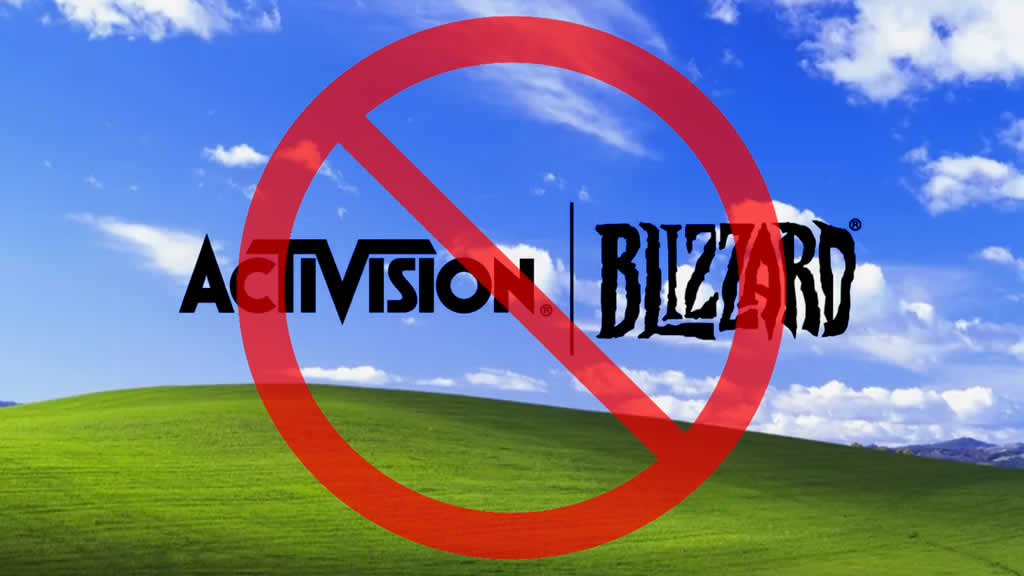
The CMA has blocked Microsoft’s planned Activision Blizzard deal. Lawyers explain how it could conceivably still happen, and what could be the most likely outcomes.
The news that the UK’s Competition and Markets Authority (CMA) has blocked the takeover of Activision Blizzard by Microsoft sent shockwaves through the games industry. It immediately raised all sorts of questions. What happens if other authorities, like the US Federal Trade Commission (FTC) and the European Commission (EC), approve the deal? Could it still go through? Or is it now dead in the water? We spoke to some lawyers who specialise in the games industry to find out what might happen next.
Microsoft immediately declared that it would appeal the CMA’s decision after it was announced on 26th April. Brad Smith, Microsoft’s vice chair and president, said in a statement: “We remain fully committed to this acquisition and will appeal. The CMA’s decision rejects a pragmatic path to address competition concerns and discourages technology innovation and investment in the United Kingdom.”
An Activision Blizzard spokesperson followed this up with a somewhat extraordinary statement: “The CMA’s report contradicts the ambitions of the UK to become an attractive country to build technology businesses. We will work aggressively with Microsoft to reverse this on appeal. The report’s conclusions are a disservice to UK citizens, who face increasingly dire economic prospects. We will reassess our growth plans for the UK. Global innovators large and small will take note that – despite all its rhetoric – the UK is clearly closed for business.”
Toys out of the pram?

Alex Tutty, head of the Computer Games Department at UK law firm Sheridans.
Alex Tutty, head of the Computer Games Department at UK law firm Sheridans, was surprised by the Activision Blizzard statement. “It doesn’t seem very sensible to basically slag off the UK,” he says. “It seems like an angry reaction … toys out of the pram completely.”
He adds that the CMA’s decision seems well thought through. “Having spoken to clients … one of the statements is that the CMA doesn’t understand games. And I don’t think that’s true. I think the CMA has taken a really long time to understand games, this is not some sort of rush decision – it has properly considered this, knowing because if it says ‘no’, it’s going to be appealed.”
The CMA emphasised that it was Microsoft’s dominance in cloud gaming that helped to influence its decision, saying in its report: “We have concluded that the merger would result in the most powerful operator in the fast-developing market for cloud gaming, with a current market share of 60-70%, acquiring a portfolio of world-leading games with the incentive to withhold those games from competitors and substantially weaken competition in this important growing market.”
Microsoft’s appeal against the decision could take some time. Piers Harding-Rolls at Ampere Analysis has noted that the “Competition Appeal Tribunal site says straightforward cases are aimed to be dealt with within 9 months”, which could mean that we might not see a decision until 2024. It’s also likely that the appeal won’t go the way Microsoft wants it to, says Anna Poulter-Jones, an associate in the Computer Games and Digital Media Groups at Sheridans: “The CMA tends to come out on top in appeals”.
If the outcome of the CMA appeal is unsuccessful for Microsoft, there’s still a chance that the deal might be approved by the EC, which is set to declare its findings on 22 May. One report in March suggested that the EC might rule in favour of the takeover, and the deal has already been approved in South Africa, Japan, Chile, Brazil, Saudi Arabia and Serbia. Then again, in the US, the FTC has sued Microsoft in an attempt to block the acquisition of Activision Blizzard. That challenge could take a considerable amount of time to be resolved.
So what happens if the deal is approved in some territories but vetoed in others? That kind of thing has happened before, notes Anna. “We’ve had situations in other tech deals where, for example, in the US a deal has been allowed to go ahead, but the CMA has blocked it, and so the deal has died.”
Not dead, but sleeping?

Anna Poulter-Jones, associate in the Computer Games and Digital Media Groups at Sheridans.
Does that mean the Activision Blizzard acquisition is essentially dead now?
Not necessarily, argues David Hoppe, founder and managing partner of the tech-focused legal firm Gamma Law, based in San Francisco. “Note that the CMA has previously said that they had no further concerns regarding anticompetitive effects in the console market, so the decision today just related to the cloud gaming market sector,” he said in an e-mail sent soon after the CMA ruling. “If the decision stands and the deal receives approval in other jurisdictions, Microsoft could geofence the Activision games out of the UK, and that would presumably address the CMA’s concerns.”

David Hoppe, founder and managing partner at Gamma Law.
But would cutting off the UK from cloud-based versions of Activision titles be an acceptable solution for Microsoft or Activision Blizzard? Alex argues that if the CMA’s decision is upheld, then really the only way around it would be for Microsoft to split off parts of the company, for example by turning Azure, Microsoft’s cloud-computing division, into a separate, independent business.
“They’re going to massively resist that,” says Alex. “Cloud is growing. Are they going to be prepared to hive off Azure, which is going to be a growing industry, in order to get this through?”
He adds that keeping a UK arm of Activision Blizzard as a separate, independent company wouldn’t cut it because of the global nature of cloud gaming. “It’s all run out of one entity in order for it to work.”
The way forward
So, what next? “We can certainly expect more statements, more lobbying,” says Anna. Alex agrees, adding that we’ll see renewed promises from Microsoft about things the firm could change that might sway the minds of regulators. However, he points out that the CMA has already said it would rather not rely on promises. “Reading the CMA statements, the CMA was saying, ‘You can make these promises, but then we have to police them. We don’t want to police them, our job is not to police.”
Indeed, the CMA has said it would prefer to maintain the current level of competition rather than spend years ensuring that Microsoft upholds its pledges to, for example, ensure that Call of Duty remains available on PlayStation consoles: “Microsoft proposed a remedy that sought to compensate for the loss of competition with a set of obligations that would regulate its behaviour and how it did business for a period of ten years. Having carefully considered Microsoft’s proposal, we found that it would not restore the competitive dynamism that would be lost as a result of the Merger. We decided, therefore, that a remedy that preserves competition, rather than one that imposes global regulatory oversight, is the only effective and proportionate way forward.”
Alex thinks that only something drastic, like selling off Azure, might cause the CMA to reconsider. “But at the end of the day, the changes that need to be done would fundamentally affect the bottom line and make the feasibility of this deal, well, the economics of it, not work,” he says. He reckons the best scenario for Microsoft is that the FTC and the EC go on to approve the deal, which would make the CMA “look like an outlier”. That could potentially put pressure on the CMA to reconsider their judgement.
Then again, approval doesn’t seem likely in the US, says David. In fact, the CMA’s decision might encourage the FTC to squash the deal. “The position of the majority FTC commissioners appears to be quite strong in opposition to the acquisition,” he says. “It is difficult to predict how the internal FTC judicial process currently underway will develop, but I believe that this decision from the CMA will strengthen the FTC’s resolve to continue opposition to the deal.”
Even if Microsoft manages to win approval from the FTC and EC, Anna reckons the life of the deal will all come down to whether Microsoft can convince the Competition Appeal Tribunal to overturn the CMA’s decision. “If they don’t win on appeal, the deal is dead.”






6 Trackbacks and Pingbacks